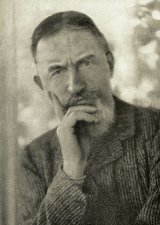Pygmalion Page #10
Pygmalion is a play by George Bernard Shaw, named after a Greek mythological figure. It was first presented on stage to the public in 1913. In ancient Greek mythology, Pygmalion fell in love with one of his sculptures, which then came to life.
DOOLITTLE. The poor man's club, Governor: why shouldn't I? PICKERING. Do let him tell his story, Higgins. DOOLITTLE. He told me what was up. And I ask you, what was my feelings and my duty as a father? I says to the boy, "You bring me the luggage," I says-- PICKERING. Why didn't you go for it yourself? DOOLITTLE. Landlady wouldn't have trusted me with it, Governor. She's that kind of woman: you know. I had to give the boy a penny afore he trusted me with it, the little swine. I brought it to her just to oblige you like, and make myself agreeable. That's all. HIGGINS. How much luggage? DOOLITTLE. Musical instrument, Governor. A few pictures, a trifle of jewelry, and a bird-cage. She said she didn't want no clothes. What was I to think from that, Governor? I ask you as a parent what was I to think? HIGGINS. So you came to rescue her from worse than death, eh? DOOLITTLE [appreciatively: relieved at being understood] Just so, Governor. That's right. PICKERING. But why did you bring her luggage if you intended to take her away? DOOLITTLE. Have I said a word about taking her away? Have I now? HIGGINS [determinedly] You're going to take her away, double quick. [He crosses to the hearth and rings the bell]. DOOLITTLE [rising] No, Governor. Don't say that. I'm not the man to stand in my girl's light. Here's a career opening for her, as you might say; and-- Mrs. Pearce opens the door and awaits orders. HIGGINS. Mrs. Pearce: this is Eliza's father. He has come to take her away. Give her to him. [He goes back to the piano, with an air of washing his hands of the whole affair]. DOOLITTLE. No. This is a misunderstanding. Listen here-- MRS. PEARCE. He can't take her away, Mr. Higgins: how can he? You told me to burn her clothes. DOOLITTLE. That's right. I can't carry the girl through the streets like a blooming monkey, can I? I put it to you. HIGGINS. You have put it to me that you want your daughter. Take your daughter. If she has no clothes go out and buy her some. DOOLITTLE [desperate] Where's the clothes she come in? Did I burn them or did your missus here? MRS. PEARCE. I am the housekeeper, if you please. I have sent for some clothes for your girl. When they come you can take her away. You can wait in the kitchen. This way, please. Doolittle, much troubled, accompanies her to the door; then hesitates; finally turns confidentially to Higgins. DOOLITTLE. Listen here, Governor. You and me is men of the world, ain't we? HIGGINS. Oh! Men of the world, are we? You'd better go, Mrs. Pearce. MRS. PEARCE. I think so, indeed, sir. [She goes, with dignity]. PICKERING. The floor is yours, Mr. Doolittle. DOOLITTLE [to Pickering] I thank you, Governor. [To Higgins, who takes refuge on the piano bench, a little overwhelmed by the proximity of his visitor; for Doolittle has a professional flavor of dust about him]. Well, the truth is, I've taken a sort of fancy to you, Governor; and if you want the girl, I'm not so set on having her back home again but what I might be open to an arrangement. Regarded in the light of a young woman, she's a fine handsome girl. As a daughter she's not worth her keep; and so I tell you straight. All I ask is my rights as a father; and you're the last man alive to expect me to let her go for nothing; for I can see you're one of the straight sort, Governor. Well, what's a five pound note to you? And what's Eliza to me? [He returns to his chair and sits down judicially]. PICKERING. I think you ought to know, Doolittle, that Mr. Higgins's intentions are entirely honorable. DOOLITTLE. Course they are, Governor. If I thought they wasn't, I'd ask fifty. HIGGINS [revolted] Do you mean to say, you callous rascal, that you would sell your daughter for 50 pounds? DOOLITTLE. Not in a general way I wouldn't; but to oblige a gentleman like you I'd do a good deal, I do assure you. PICKERING. Have you no morals, man? DOOLITTLE [unabashed] Can't afford them, Governor. Neither could you if you was as poor as me. Not that I mean any harm, you know. But if Liza is going to have a bit out of this, why not me too? HIGGINS [troubled] I don't know what to do, Pickering. There can be no question that as a matter of morals it's a positive crime to give this chap a farthing. And yet I feel a sort of rough justice in his claim. DOOLITTLE. That's it, Governor. That's all I say. A father's heart, as it were. PICKERING. Well, I know the feeling; but really it seems hardly right-- DOOLITTLE. Don't say that, Governor. Don't look at it that way. What am I, Governors both? I ask you, what am I? I'm one of the undeserving poor: that's what I am. Think of what that means to a man. It means that he's up agen middle class morality all the time. If there's anything going, and I put in for a bit of it, it's always the same story: "You're undeserving; so you can't have it." But my needs is as great as the most deserving widow's that ever got money out of six different charities in one week for the death of the same husband. I don't need less than a deserving man: I need more. I don't eat less hearty than him; and I drink a lot more. I want a bit of amusement, cause I'm a thinking man. I want cheerfulness and a song and a band when I feel low. Well, they charge me just the same for everything as they charge the deserving. What is middle class morality? Just an excuse for never giving me anything. Therefore, I ask you, as two gentlemen, not to play that game on me. I'm playing straight with you. I ain't pretending to be deserving. I'm undeserving; and I mean to go on being undeserving. I like it; and that's the truth. Will you take advantage of a man's nature to do him out of the price of his own daughter what he's brought up and fed and clothed by the sweat of his brow until she's growed big enough to be interesting to you two gentlemen? Is five pounds unreasonable? I put it to you; and I leave it to you. HIGGINS [rising, and going over to Pickering] Pickering: if we were to take this man in hand for three months, he could choose between a seat in the Cabinet and a popular pulpit in Wales. PICKERING. What do you say to that, Doolittle? DOOLITTLE. Not me, Governor, thank you kindly. I've heard all the preachers and all the prime ministers--for I'm a thinking man and game for politics or religion or social reform same as all the other amusements--and I tell you it's a dog's life anyway you look at it. Undeserving poverty is my line. Taking one station in society with another, it's--it's--well, it's the only one that has any ginger in it, to my taste. HIGGINS. I suppose we must give him a fiver. PICKERING. He'll make a bad use of it, I'm afraid. DOOLITTLE. Not me, Governor, so help me I won't. Don't you be afraid that I'll save it and spare it and live idle on it. There won't be a penny of it left by Monday: I'll have to go to work same as if I'd never had it. It won't pauperize me, you bet. Just one good spree for myself and the missus, giving pleasure to ourselves and employment to others, and satisfaction to you to think it's not been throwed away. You couldn't spend it better.
Translation
Translate and read this book in other languages:
Select another language:
- - Select -
- 简体中文 (Chinese - Simplified)
- 繁體中文 (Chinese - Traditional)
- Español (Spanish)
- Esperanto (Esperanto)
- 日本語 (Japanese)
- Português (Portuguese)
- Deutsch (German)
- العربية (Arabic)
- Français (French)
- Русский (Russian)
- ಕನ್ನಡ (Kannada)
- 한국어 (Korean)
- עברית (Hebrew)
- Gaeilge (Irish)
- Українська (Ukrainian)
- اردو (Urdu)
- Magyar (Hungarian)
- मानक हिन्दी (Hindi)
- Indonesia (Indonesian)
- Italiano (Italian)
- தமிழ் (Tamil)
- Türkçe (Turkish)
- తెలుగు (Telugu)
- ภาษาไทย (Thai)
- Tiếng Việt (Vietnamese)
- Čeština (Czech)
- Polski (Polish)
- Bahasa Indonesia (Indonesian)
- Românește (Romanian)
- Nederlands (Dutch)
- Ελληνικά (Greek)
- Latinum (Latin)
- Svenska (Swedish)
- Dansk (Danish)
- Suomi (Finnish)
- فارسی (Persian)
- ייִדיש (Yiddish)
- հայերեն (Armenian)
- Norsk (Norwegian)
- English (English)
Citation
Use the citation below to add this book to your bibliography:
Style:MLAChicagoAPA
"Pygmalion Books." Literature.com. STANDS4 LLC, 2025. Web. 10 Jan. 2025. <https://www.literature.com/book/pygmalion_78>.




Discuss this Pygmalion book with the community:
Report Comment
We're doing our best to make sure our content is useful, accurate and safe.
If by any chance you spot an inappropriate comment while navigating through our website please use this form to let us know, and we'll take care of it shortly.
Attachment
You need to be logged in to favorite.
Log In